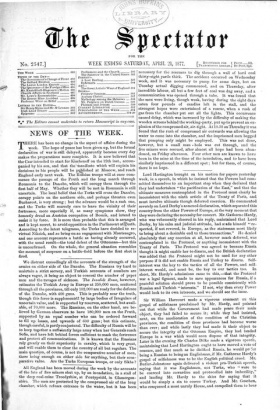Lord Hartington brought on his motion for papers yesterday week,
in a speech, in which he insisted that the Powers had com- mitted themselves to an important step when they declared that they had undertaken "the pacification of the East," and that the ultimate measures contemplated in the Protocol must clearly be inconsistent with the ninth article of the Treaty of Paris, and must involve ultimate though deferred coercion. He commented severely on Lord Derby's annexed declaration, which separated this country from the other Powers of Europe, at the very moment that theywere declaring the necessity for concert. Mr. Gathorne Hardy, who was vehemently cheered in his reply, maintained that Lord Derby, by his calm and judicial attitude, had made himself "re- spected, if not revered, in Europe, as the statesman most likely to bring about a desirable end to these transactions." He denied absolutely that any coercion at all, however much deferred, was contemplated in the Protocol, or anything inconsistent with the Treaty of Paris. The Protocol was agreed to because Russia thought it might enable her to disarm, and the British declaration was added that the Protocol might not be used for any other purpose if it did not enable Russia and Turkey to disarm. Self- interest was the key to the tactics of all the Powers, and self- interest would, and must be, the key to our tactics too. In short, Mr. Hardy's admissions came to this,—that the Protocol was a legal figment, made to save appearances for Russia, if a peaceful solution should prove to be possible consistently with Russian and Turkish "interests." If not, why then every Power would look to its own interests, and we should see the issue.


































